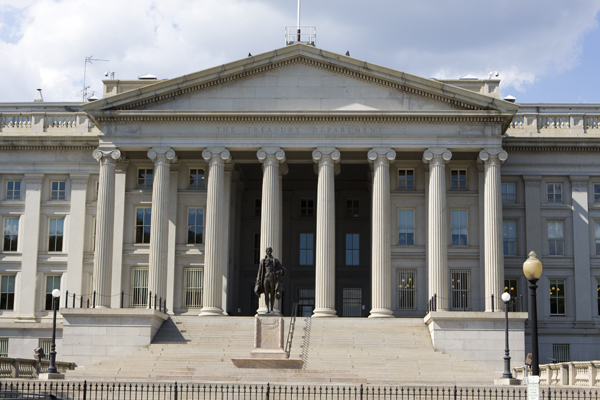Tax Day Essay: “On Civil Disobedience”

US Treasury Building, Washington DC
I never subscribed to the first sentence of Thoreau’s famous essay “Civil Disobedience “(1849).
That lede has been misleadingly overplayed, in terms of distracting from more central points of his essay and it also has served to legitimize certain anti-social individualistic, anti-government, libertarian views:
I heartily accept the motto, – “That government is best which governs least”; and I should like to see it acted up to more systematically. Carried out, it finally amounts to this, which I also believe, – “That government is best which governs not at all”, and when men are prepared for it, that will be the kind of government which they will have.
When will men ever be “prepared” for pure anarchism? Even if they were sufficiently altruistic, would some form of communitarian organization be preferable? But I digress from the point I am trying to make with this Tax Day post.
Thoreau was a strong opponent of the US invasion of Mexico, and he advocated withholding of taxes as a form of protest – civil disobedience. It was not taxes and government, per se, that were his primary issue concern, but rather his moral revulsion at slavery and the deep injustice of the Mexican war. His conscience and his sense of personal responsibility forced him to not contribute to those efforts in any way.
That principled equality, anti-war, anti-imperial stance and Thoreau’s civil disobedience tactics have not been so relevant since the Vietnam War. Thoreau wrote:
If one were to tell me that this were a bad government because it taxed certain foreign commodities brought to its ports, it is most probably that I should not make an ado about it, for I can do without them. All machines have their friction; and possibly this does enough good to counterbalance the evil. … But when the friction comes to have its machine, and oppression and robbery are organized, I say, let us not have such a machine any longer. In other words, when a sixth of the population of a nation which has undertaken to be the refuge of liberty are slaves, and a whole country is unjustly overrun, and conquered by a foreign army, and subjected to military law, I think that it is not too soon for honest men to rebel and revolutionize. What makes this duty the more urgent is the fact, that the country so over-run is not our own, but ours is the invading army.
Now think of these words in terms of the huge black population now in prison and segregated in hopeless urban ghettos.
Think about US army invasion, war, and occupation of Iraq and Afghanistan.
Think of the irresponsible and corrupt failure to respond to global warming.
Thoreau targeted the political source of the problem (as did Martin Luther King over 100 years later in his “Letter from Birmingham Jail” where he scorned well- meaning white liberals, and called for direct action non-violent civil disobedience). Thoreau wrote:
Those who, while they disapprove of the character and measures of a government, yield to it their allegiance and support, are undoubtedly its most conscientious supporters, and so frequently the most serious obstacles to reform.
Thoreau realized that real social change depended upon individual integrity, which in turn required the courage to act upon one’s convictions – and take bold conscience based actions that put one at risk:
Action from principle, the perception and performance of right, changes things and relations, it is essentially revolutionary, and does not consist wholly with anything which was.
Thoreau realized that the individual exercising his conscience in action against the state would be treated harshly and unjustly, particularly the poor and powerless compared to the elite (are there not echoes today in Wall Street bandits not going to jail while millions of young black men serve long prison time for crack cocaine?):
If a man who has no property refuses but once to earn nine shillings for the State, he is put in prison for a period unlimited by any law I know, … but if he he should steal ninety times nine shillings from the State, he is soon permitted to go at large.
Thoreau laid out the test and summed up the individual’s duty to take action – a call to action that remains extremely relevant today (and echoed in the equally famous “body on the gears” speech by 1960’s Berkelely free speech movement leader, Mario Savio. Thoreau wrote:
If the injustice is part of the necessary friction of the machine of government, let it go, let it go; perchance it will wear smooth, – certainly the machine will wear out. If the injustice has a spring, or a pulley, or a rope, or a crank, exclusively for itself, then perhaps you may consider whether the remedy will not be worse than the evil; but if it is of such a nature that it requires you to be the agent of injustice to another, then I say break the law. Let your life be a counter friction to stop the machine. What I have to do is to see, at any rate, that I do not lend myself to the wrong which I condemn.
Amen!